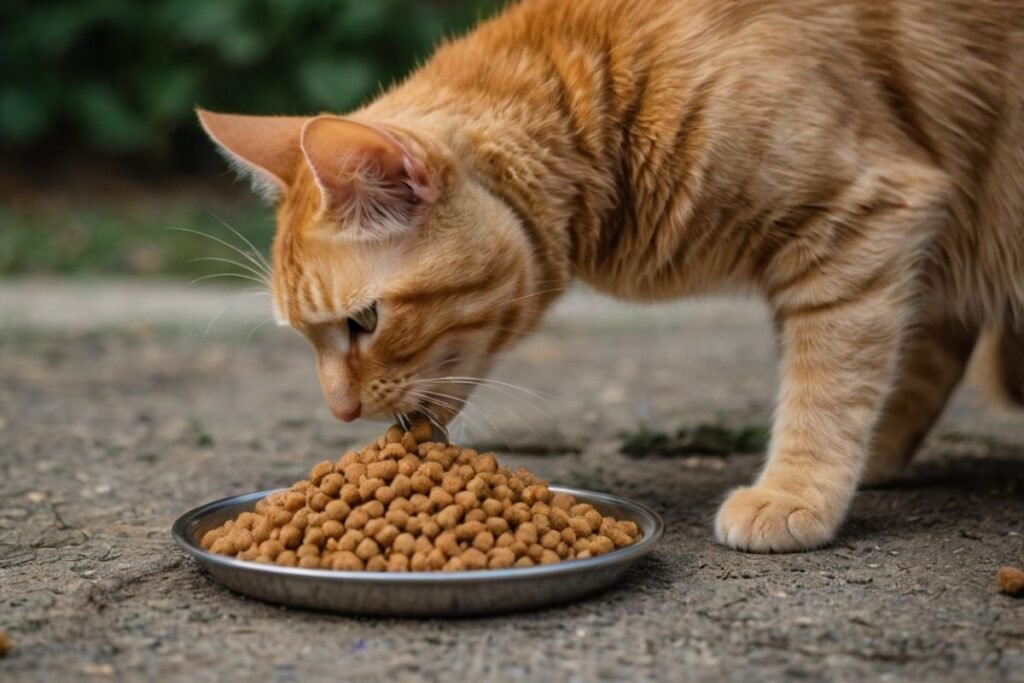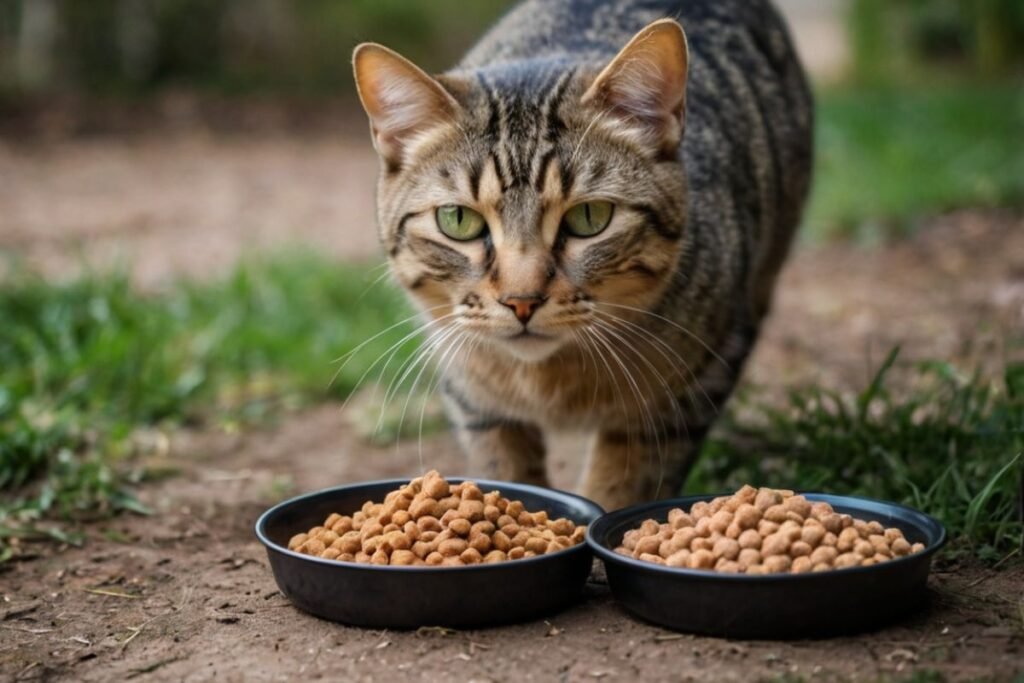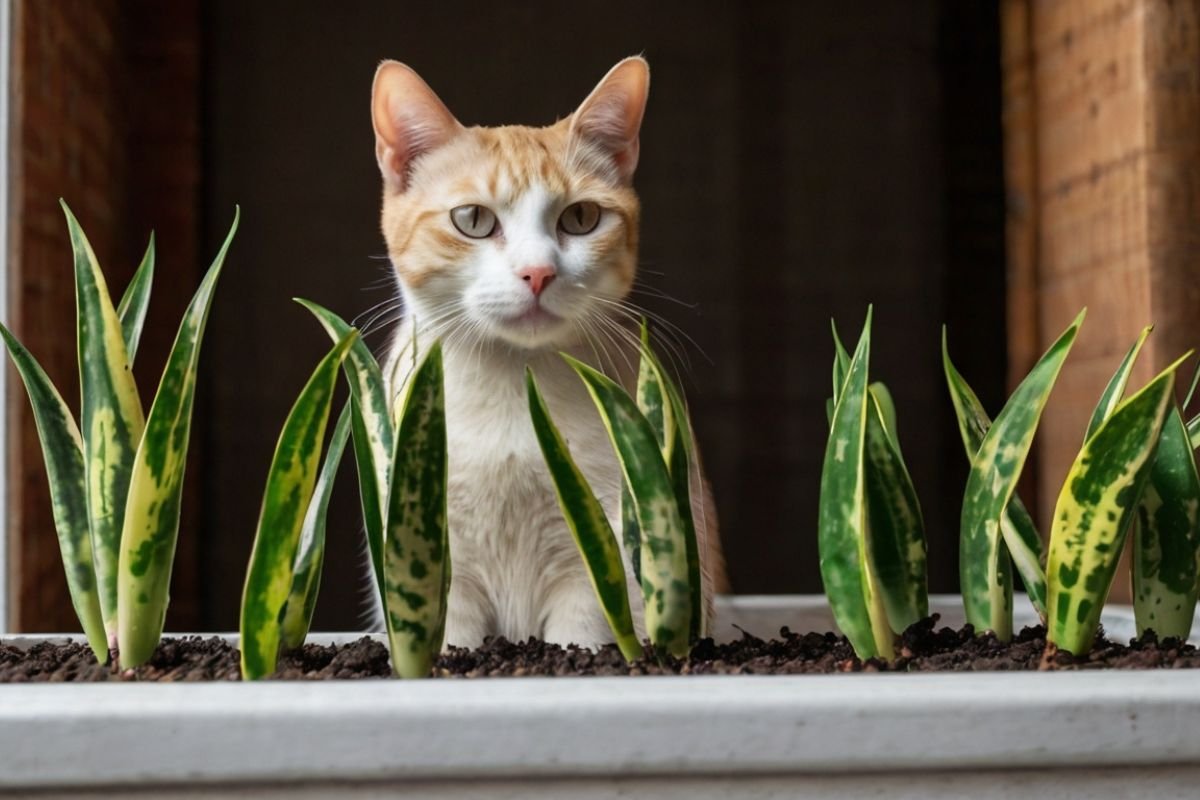It’s a scene many pet owners know well. The dog food bowl sits on the kitchen floor, and your cat stares at it with those wide, curious eyes. Maybe your cat has even snuck a few bites when you weren’t looking. This exact scenario played out in my home last week when my orange tabby, Rio, decided to investigate my neighbor’s dog’s dinner during a visit. It made me wonder – can cats safely eat dog food?
If you’ve ever caught your feline friend sampling from the canine cuisine or you’re simply curious about cross-species dining, you’re not alone. Many pet parents wonder if sharing food between their furry family members is safe or harmful.
In this comprehensive guide, we’ll dig into everything you need to know about cats and dog food. We’ll explore the key differences between cat and dog nutritional needs, what happens when cats eat dog food, and how to keep your curious kitty eating the right diet for their health.

Table of Contents
The Short Answer: Not Ideal for Cats
Let’s start with the quick answer before diving deeper. While a small taste of dog food won’t harm your cat, regular consumption can lead to serious health problems. Dog food simply doesn’t contain the right balance of nutrients that cats need to thrive.
Cats are obligate carnivores. This means they must eat meat to survive. Dogs, on the other hand, are omnivores who can digest both plant and animal matter. These basic biological differences have led to very different nutritional needs – and very different pet foods.
Also read, Can Cats Eat Grapes?
Understanding Feline Nutrition: What Cats Really Need
To fully grasp why dog food isn’t right for cats, we need to understand what makes feline nutrition unique.
Protein Requirements
Cats need lots of protein – much more than dogs do. Their bodies use protein not just for muscle maintenance but also for energy. While dogs can get energy from carbs and fats, cats rely heavily on protein.
Adult cats need at least 26% protein in their diet, while dogs can manage with about 18%. This isn’t just a small gap – it’s a major nutritional difference.
When Rio had his annual vet check-up last month, his vet stressed how important high-quality protein is for keeping his coat that bright orange color we love so much. Without enough protein, cats can develop dull coats, muscle loss, and overall weakness.
Essential Amino Acids
Cats need certain amino acids that dogs can produce in their own bodies. The most famous of these is taurine.
Taurine is vital for cat health. It supports:
- Heart function
- Vision
- Reproductive health
- Bile salt formation
- Immune system function
Dogs can make their own taurine, so dog food often doesn’t contain enough for cats. A cat who doesn’t get enough taurine can develop serious health problems, including heart disease and blindness.
Other amino acids cats need more of include arginine, methionine, and cysteine. These building blocks of protein play key roles in everything from detoxifying ammonia to maintaining healthy fur.
Fats and Fatty Acids
Cats need specific fatty acids in their diet. One crucial one is arachidonic acid, which cats cannot make themselves. This fatty acid helps with:
- Skin health
- Kidney function
- Reproduction
- Blood clotting
Dogs can produce arachidonic acid on their own, so it’s not always added to dog food in sufficient amounts for cats.
Vitamins and Minerals
Cats have unique vitamin needs too. For instance, they need preformed Vitamin A – the kind found in animal tissues. Dogs can convert plant carotenoids into Vitamin A, but cats lack the enzyme to do this efficiently.
Cats also need more niacin (Vitamin B3) and thiamine (Vitamin B1) than dogs do. These B vitamins support energy production and nervous system function.
Water Content
Many cats don’t drink enough water naturally. They evolved from desert-dwelling ancestors who got most of their moisture from their prey. This is why wet cat food plays an important role in keeping cats hydrated.
Dog food often doesn’t provide the moisture content that cats need, which can increase the risk of urinary tract problems and kidney issues.
The Problems With Cats Eating Dog Food
Now that we understand what cats need nutritionally, let’s look at what can happen when they regularly eat dog food instead of cat food.
Nutritional Deficiencies
The biggest risk of feeding a cat dog food is nutritional deficiency. Without enough taurine, protein, and other essential nutrients, cats can develop serious health problems.
Signs of nutritional deficiency in cats may include:
- Weight loss
- Lethargy
- Poor coat quality
- Vision problems
- Heart issues
- Digestive upset
- Immune system weakness
I once saw Rio looking longingly at some dog food at a friend’s house. After explaining to my friend why cats need their own food, we quickly redirected him to his own dinner. His health is too important to risk with the wrong diet.
Taurine Deficiency
Taurine deficiency deserves special mention because it can cause severe and sometimes irreversible health problems in cats. Without enough taurine, cats can develop:
- Dilated cardiomyopathy (a form of heart disease)
- Retinal degeneration leading to blindness
- Reproductive failure
- Poor growth in kittens
- Immune system problems
What makes taurine deficiency especially concerning is that symptoms often don’t show up until significant damage has already occurred. By the time you notice your cat having problems, they might already have heart damage or vision loss.
Protein Insufficiency
When cats don’t get enough protein, their bodies may start breaking down their own muscle tissue to meet their needs. This can lead to:
- Muscle wasting
- Weakness
- Poor coat condition
- Slow wound healing
- Increased risk of infections
Vitamin Imbalances
Without the right vitamins in the right amounts, cats can develop various health issues. For example, without enough Vitamin A, cats may develop:
- Night blindness
- Skin problems
- Weakened immune function
- Poor coat quality
Dehydration and Urinary Issues
Cats who eat dry dog food and don’t drink enough water are at higher risk for:
- Chronic dehydration
- Urinary tract infections
- Kidney problems
- Crystal formation in urine
- Urinary blockages (especially dangerous for male cats)
This last point is especially important for male cats like Rio. Male cats are prone to urinary blockages, which can quickly become life-threatening emergencies.
What About Just a Taste?
You might be wondering if a small amount of dog food now and then is OK for your cat. The answer depends on how much and how often.
A few kibbles of dog food won’t harm a healthy adult cat. If your curious kitty sneaks a couple of bites from the dog’s bowl, don’t panic. It’s not an emergency situation.
However, there are some situations where even a small amount of dog food could be problematic:
- Cats with existing health conditions (especially kidney, heart, or urinary issues)
- Kittens who need optimal nutrition for growth
- Senior cats with increased nutritional needs
- Pregnant or nursing cats
When Rio was curious about the neighbor’s dog food, I didn’t worry too much about the few pieces he managed to grab. But I made sure to prevent him from making it a habit by keeping him away from the dog’s eating area after that.
What To Do If Your Cat Eats Dog Food
If you catch your cat eating dog food, here’s what to do:
- Don’t panic – A small amount won’t cause immediate harm.
- Remove access – Gently move your cat away from the dog food.
- Offer cat food – Provide proper cat food as an alternative.
- Prevent future access – Find ways to keep your cat away from the dog’s food.
- Watch for symptoms – If your cat ate a large amount, watch for vomiting, diarrhea, or unusual behavior.
If your cat has eaten a substantial amount of dog food or shows any concerning symptoms, contact your veterinarian for advice.
When Dog Food Becomes Dangerous
While occasional nibbling isn’t usually harmful, certain situations can make dog food particularly dangerous for cats:
Medications in Dog Food
Some dog foods contain medications or supplements that are safe for dogs but potentially toxic to cats. For example, some dog foods contain garlic or onion powder as flavoring, which can cause anemia in cats even in small amounts.
Prescription Dog Foods
Special prescription dog foods for specific health conditions may contain ingredients or medication levels that could harm cats. These foods are formulated for specific canine health issues and should never be fed to cats.
Size and Texture Issues
Large dog kibble can be hard for cats to chew and may pose a choking hazard, especially for kittens or senior cats with dental issues. The texture and hardness of dog food is designed for dog teeth, not cat teeth.
Creative Solutions for Multi-Pet Households
If you have both cats and dogs, you’ve probably faced the challenge of keeping each pet’s food separate. Here are some practical solutions:
Scheduled Feeding Times
Rather than free-feeding (leaving food out all day), consider scheduled meal times where you can supervise. Feed your cat and dog in separate rooms if possible, and pick up the bowls when they’re finished.
Elevated Feeding Stations
Cats are typically more agile than dogs and can jump to higher surfaces. Consider placing your cat’s food on a counter, table, or cat tree where dogs can’t reach it.
Pet Gates with Cat Doors
You can find pet gates with small cat doors that allow your cat access while keeping dogs out. This creates a safe space for your cat to eat undisturbed.
Microchip Feeders
There are now feeders that open only for pets with the correct microchip. This high-tech solution ensures your cat’s food is only accessible to them.
The Right Diet for Your Cat
Now that we know why dog food isn’t suitable for cats, let’s talk about what makes a good cat food.
Choosing the Right Cat Food

The best diet for your cat will depend on their age, health status, and individual needs. Here are some general guidelines:
Reading Labels
Look for cat foods that list a high-quality protein source as the first ingredient. The label should also indicate that the food is “complete and balanced” according to AAFCO (Association of American Feed Control Officials) standards.
Wet vs. Dry Food
Many veterinarians recommend wet food for cats because of its higher moisture content. However, a combination of wet and dry food can provide a good balance of hydration and dental benefits.
When Rio was younger, he was a picky eater who preferred dry food. We gradually introduced wet food by mixing a small amount with his dry kibble, slowly increasing the proportion until he accepted both types.
Life Stage Formulations
Cats have different nutritional needs at different life stages:
- Kittens need more calories, protein, and certain minerals for growth.
- Adult cats need maintenance formulas to stay healthy.
- Senior cats may benefit from foods with easier-to-digest proteins and joint support.
Choose a formula that matches your cat’s current life stage.
Special Health Considerations
Some cats have specific health needs that may require special diets:
- Weight management formulas for overweight cats
- Urinary health formulas for cats prone to urinary issues
- Sensitive digestion formulas for cats with GI issues
- Kidney support formulas for cats with kidney disease
Always consult with your veterinarian before switching to a specialized diet.
The Importance of Gradual Transitions
If you need to change your cat’s diet for any reason, do it gradually. Abrupt changes can cause digestive upset.
A typical transition schedule might look like this:
- Days 1-2: 75% old food, 25% new food
- Days 3-4: 50% old food, 50% new food
- Days 5-6: 25% old food, 75% new food
- Day 7: 100% new food
This slow transition gives your cat’s digestive system time to adjust to the new food.
Myths and Misconceptions About Cat Nutrition
There are many myths about what cats should and shouldn’t eat. Let’s clarify some common misconceptions:
Myth: Cats Need Milk
Many adult cats are actually lactose intolerant and can get digestive upset from cow’s milk. Water is the essential fluid cats need.
Myth: Cats Can Be Vegetarians
Remember that cats are obligate carnivores. They physically cannot get all their required nutrients from plant sources alone.
Myth: All Cat Foods Are Basically the Same
Cat foods can vary greatly in quality, ingredients, and nutritional value. Price often (but not always) reflects quality.
Myth: Cats Know What’s Good for Them
While cats may have preferences, they don’t always choose what’s nutritionally best. Some cats will happily eat foods that aren’t good for them.
When to Consult a Veterinarian
You should talk to your vet about your cat’s diet if:
- Your cat has been regularly eating dog food
- You notice weight loss, poor coat quality, or other signs of nutritional deficiency
- Your cat has a health condition that might benefit from a special diet
- You’re considering making significant changes to your cat’s diet
- Your cat refuses to eat their food for more than 24 hours
Final Thoughts: Keeping Your Cat Healthy
Your cat’s diet plays a huge role in their overall health and wellbeing. While the occasional taste of dog food won’t harm your cat, it’s important to provide them with food that meets their unique nutritional needs.
As a cat parent, one of the best things you can do for your feline friend is to feed them a high-quality cat food that’s appropriate for their age and health status. Your veterinarian can help you choose the best options for your specific cat.
When Rio tried to sample that dog food at the neighbor’s house, it reminded me how important it is to be vigilant about what our pets eat. The right nutrition gives our cats the best chance at a long, healthy, happy life – and that’s something every cat deserves.
Remember, cats aren’t just small dogs. They have their own special dietary needs that must be met for them to thrive. By understanding these needs and providing the right food, you’re giving your feline friend the gift of good health.
Disclaimer: Our articles are for informational purposes only and are not intended to replace professional veterinary advice. Always consult with your veterinarian about your cat’s specific nutritional needs and before making any significant changes to their diet.

Shahriar Robin is the creator of WhatPetsCanEat.com, a passionate pet lover and dedicated cat dad to Rio, a curious two-year-old orange feline who inspired this website. With a love for animals and a knack for research, Shahriar shares trusted, easy-to-understand information to help fellow pet owners make safe, healthy food choices for their furry friends.


